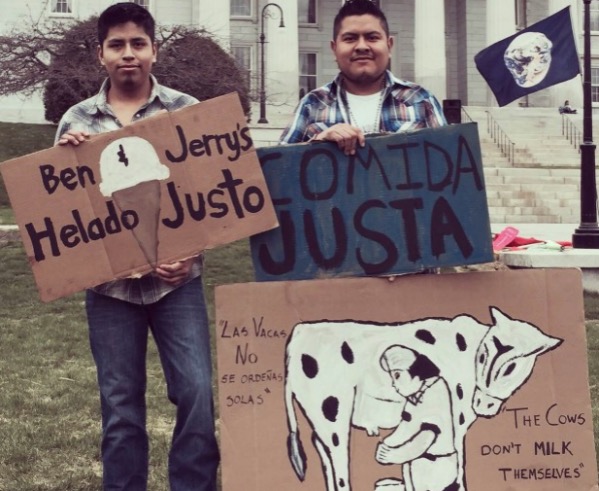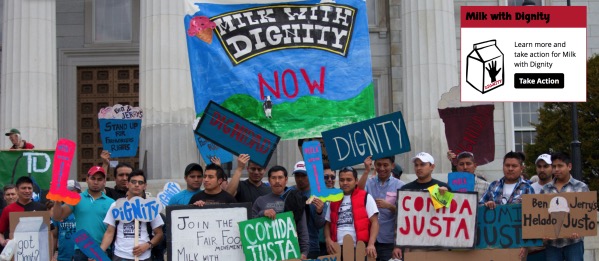[hupso title=”Will @Benandjerrys help improve conditions for #VT dairy workers? @MigrantJustice” url=”https://ciw-online.org/blog/2015/05/milk-with-dignity-launch/”]

Great new article in Civil Eats asks: “A little Justice With Your Cherry Garcia?”
Worker-driven Social Responsibility — the market-based model for the enforceable protection of human rights in corporate supply chains at the heart of the CIW’s Fair Food Program — is a proven success. To quote an earlier post, entitled, “Worker-driven Social Responsibility (WSR): A new idea for a new century“:
… The Fair Food Program has effected unprecedented change in Florida’s fields since it was implemented across 90% of the state’s tomato industry in 2011. It has eliminated or greatly reduced longstanding abuses from sexual harassment to modern-day slavery, added over $15 million [Update: now $17 million and counting] in Fair Food Premiums to farm payrolls, and earned the praise of human rights experts from the White House to the United Nations. It has been called “one of the great human rights success stories of our day” in the Washington Post and “the best workplace monitoring program” in the US on the front page of the New York Times.
President Clinton, on the occasion of the presentation of the 2014 Clinton Global Citizen Award to the CIW for “defending the human rights of farmworkers across the United States,” agreed, phrasing his opinion of the model in somewhat folksier language:
“You’ve got a success model, and you ought to put the pedal to the metal.”
Well, news came this week out of Vermont that an organization of dairy workers, Migrant Justice/Justicia Migrante, is doing just that. Calling on Ben & Jerry’s to “stand up for farmworkers’ rights in its supply chain,” Migrant Justice launched a campaign this month to demand that the iconic ice cream giant use its market power to support a new worker-driven social responsibility program they are calling “Milk with Dignity.”
The WSR model has come to the Green Mountain State, and dairy workers there have new hope in their struggle for dignified working conditions and livable wages after years of what they describe as “little to no enforcement of existing health and safety laws, wage and hour laws, or housing codes.”
News of the announcement was reported in an excellent piece by Vera Chang in the food movement news site Civil Eats. The following is a series of extended excerpts from the piece (but don’t just read the excerpts, definitely head over to Civil Eats to read the whole thing).
The story begins:
In 2009, José Obeth Santiz Cruz, a 20 year-old farmworker from Chiapas, Mexico, had a fatal accident on a small dairy farm in Vermont. Cruz was working on his knees near a gutter scraper–a conveyor belt that pushes manure into a pit–when his clothing got caught, and he was strangled.
Later that year, a group of Vermont farmworkers created Migrant Justice. Enrique Balcazar, a dairy worker and organizer for the group, says he personally knows two farmworkers who have lost fingers in the same type of gutter scraper in which Cruz died. His father still suffers from a serious injury he sustained while working through the night at a dairy six years ago, and Balcazar considers himself lucky to have never been injured at work.
The growth of the dairy industry has raised serious global environmental concerns, and now we can add labor issues to that list. Vermont, which produces about 1.3 percent of the nation’s milk, has dairy in the heart of its economy: 868 dairy farms bring in $2.2 billion in economic activity each year. Over the last nine decades, the number of dairy farms in the state decreased 96 percent. With steep decline in farms, productivity per farm has increased, resulting in an increase in the hiring of outside labor to manage larger herd sizes. Vermont’s 1,200-1,500 migrant workers often bear the brunt of this shift. According to Balcazar, there is little to no enforcement of existing health and safety laws, wage and hour laws, or housing codes.
That’s where Migrant Justice’s new Milk with Dignity campaign enters the picture. The group publically called upon Ben & Jerry’s last week in a march through Vermont’s state capitol to ask the company to sign onto the campaign, in hopes of securing dignified working conditions and livable wages for farmworkers in the dairy industry. The ice cream company is the campaign’s first focus, but they have a long list of companies they hope will come on board to change conditions for dairy workers…
It then goes into the connections between Migrant Justice’s Milk with Dignity campaign and the CIW’s Campaign for Fair Food:
… Migrant Justice farmworkers are not strategizing alone. They’re partnering with the National Economic and Social Rights Initiative (NESRI) and working closely with the Coalition of Immokalee Workers (CIW), a worker-led human rights organization based in Immokalee, Florida.
The CIW’s award-winning Fair Food Program has made major strides for tomato workers in Florida. It includes a robust complaint mechanism; a rigorous auditing program, which includes interviews with over 50 percent of the workforce at each participating farm; and a “Penny per Pound” bonus, paid by participating buyers such as Whole Foods and Subway. This has resulted in the distribution of an additional $16 million to workers since the program’s inception.
Much like the Fair Food model, farms participating in the Milk with Dignity Program would follow a farmworker-defined Code of Conduct and farmworkers would receive ongoing education about their rights. Corporations would also pay a premium for milk that would get passed directly to farmworkers and farmers. All would be upheld by a third party-monitoring system, to address grievances and ensure compliance, and would be codified in a legally binding agreement…
The story closes with a look at the partnership Migrant Justice hopes to forge with Ben & Jerry’s to improve workers’ lives in the company’s supply chain, something the Vermont workers know — from having studied the long history of failed corporate social responsibility efforts and the remarkable success of the Fair Food Program in Florida’s fields — will only happen when dairy workers themselves play a leading role in monitoring and enforcing their own human rights:
… A little Justice With Your Cherry Garcia?
There are several reasons Migrant Justice hopes Ben & Jerry’s will join them in getting Milk with Dignity off the ground. First, many Migrant Justice members work within Ben & Jerry’s supply chain. The group estimates that a quarter to half of migrant farmworkers in Vermont work within Ben & Jerry’s supply chain. In addition, Ben & Jerry’s has a strong mission of social responsibility. They’ve broken ground with producers to create supplies of rGBH-free milk and cage-free eggs. The company is also partners with Fairtrade International and is working on a campaign for global climate action.
Ben & Jerry’s hasn’t yet agreed to negotiate an agreement with farmworkers to join Milk with Dignity, but the company has participated in a series of meetings with them, and says it will incorporate some of the Code of Conduct into its existing Caring Dairy program. Caring Dairy is an elective program geared toward developing and measuring sustainability indicators on dairy farms. Farmers chose an area of improvement they’d like to focus on, self-evaluate, and in exchange, receive a $4,000-8,000 bonus.
Twenty percent of farms that sell to St. Albans Cooperative Creamery Cooperative, the primary source of production for Ben & Jerry’s global supply, are part of Caring Dairy. Ben & Jerry’s Manager of Natural Resources Andrea Asch notes these 85 farms produce enough volume to cover the ice cream company’s production needs in their Vermont plant and that 94 percent of these members self-report paying minimum wage.
Migrant Justice’s Enrique Balcazar says he’s glad Ben & Jerry’s is incorporating aspects of their Code of Conduct into the Caring Dairy program, but when it comes to real change, he doesn’t want voluntary, self-evaluated programs. Instead, he’d like to see Ben & Jerry’s incentivize 10 to 20 farms to join through offering them a premium for their milk and work steadily towards sourcing 100 percent of its milk through the Milk with Dignity Program…
Don’t miss the rest of this powerful article. And be sure to head over to the Migrant Justice website to see how you can help Vermont’s dairy workers win long-overdue justice through the Milk with Dignity campaign!

